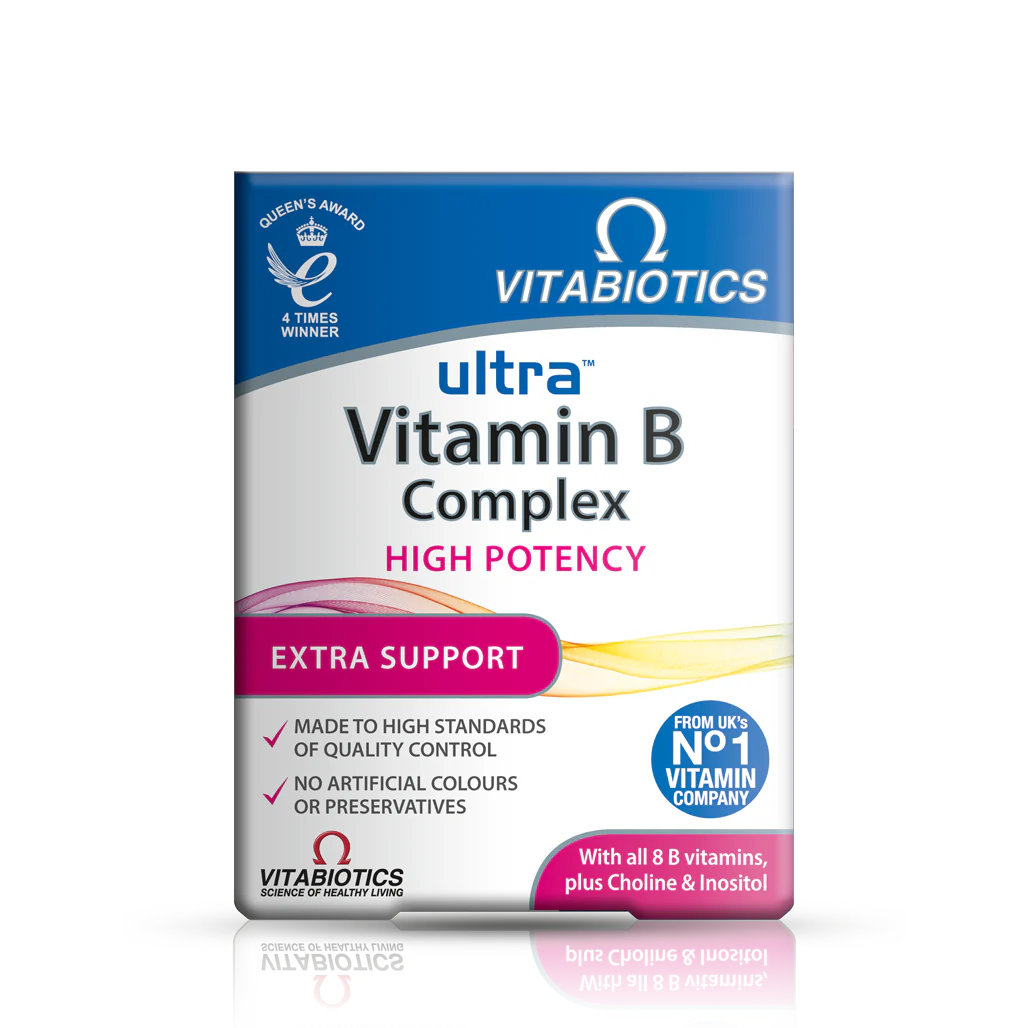Vitamin B isn’t one single vitamin; it is in fact eight different vitamins. These eight B vitamins, which can be found within one single vitamin B complex tablet, provide the body and mind with a number of benefits.
To ensure we get enough vitamin B every day, eating enough foods high in vitamin B is important. Vitamin B supplements can also help to safeguard your intake of these essential nutrients, so you can reap the range of health benefits they have to offer.
What Is Vitamin B And Vitamin B Complex?
There are in fact eight B vitamins, which each provide various health benefits. Vitamin B complex refers to the group of eight B vitamins together, usually in a vitamin B complex supplement form.
There are many vitamin B benefits, which we’ll delve into further.
List Of B Vitamins
There are eight B vitamins, each with a B vitamin name as well as a scientific name. Each of the B vitamins provides health benefits.
Vitamin B1 (thiamine) - Vitamin B1 contributes to normal energy release. It also contributes to the normal functioning of the nervous system, plus it plays a part in the normal functioning of the heart. Thiamine also contributes to normal psychological function.
Vitamin B2 (riboflavin) - Vitamin B2 not only contributes to the normal functioning of the nervous system but it also contributes to normal skin and the maintenance of normal vision whilst helping to protect cells from oxidative stress, On top of this, vitamin B2 contributes to the normal metabolism of iron. This mineral is needed for the normal formation of red blood cells and haemoglobin, which aids normal oxygen transport around the body, in turn providing us with energy. Another proven benefit of vitamin B2 is that it contributes to normal mucous membranes. These are the linings of certain organs and cavities, such as the nose and lungs.
Vitamin B3 (niacin) - Vitamin B3 contributes to normal skin, as well as the normal functioning of the nervous system, normal mucous membranes and normal psychological function. Along with vitamin B5, it also contributes to the reduction of tiredness and fatigue.
Vitamin B5 (pantothenic acid) - Vitamin B5 contributes to normal mental performance. It also contributes to normal energy release and helps to reduce tiredness and fatigue.
Vitamin B6 (pyridoxine) - Vitamin B6 has several benefits. One of these is that it contributes to the normal functioning of our immune system as well as the normal functioning of the nervous system. Vitamin B6 also contributes to the normal release of energy and it contributes to the reduction of tiredness and fatigue. Finally, vitamin B6 contributes to the regulation of hormonal activity.
Vitamin B7 (biotin) - Vitamin B7 contributes to the normal functioning of the nervous system and it contributes to normal hair and skin.
Vitamin B9 (folate and folic acid) - Folate is the natural form of vitamin B9 which is found in food, whilst folic acid is a synthetic form, usually found in supplements. Folate has a role in the process of cell division. It also contributes to maternal tissue growth during pregnancy, making it an important vitamin for pregnant women.
400µg daily supplemental folic acid, is also recommended by the Department of Health for all women who are trying to conceive as it increases maternal folate status. Low maternal folate status is a risk factor in the development of neural tube defects in the developing foetus. The beneficial effect is obtained with a supplemental folic acid daily intake of 400µg for at least one month before and up to three months after conception.
Folic acid also contributes to normal homocysteine metabolism, an important factor in heart health, and it contributes to the reduction of tiredness and fatigue. Added to this, folate contributes to the normal function of the immune system and contributes to normal psychological performance as well as normal blood formation and normal amino acid synthesis.
Vitamin B12 (cobalamin) - Vitamin B12 helps to release energy from food and it also helps with normal energy release whilst also contributing to normal red blood cell formation. Because of this, it is associated with the reduction of tiredness and fatigue. Along with folic acid, vitamin B12 also contributes to normal homocysteine metabolism. Vitamin B12 contributes to normal psychological function too and it contributes to the normal function of the immune system whilst also helping to keep the nervous system healthy.
Vitamin B complex benefits
The main benefit of a vitamin B complex is that it offers a convenient way to obtain all eight essential B vitamins. This means that by taking a vitamin B complex, you will be getting all the benefits of the individual B vitamins together.








Comments (0)